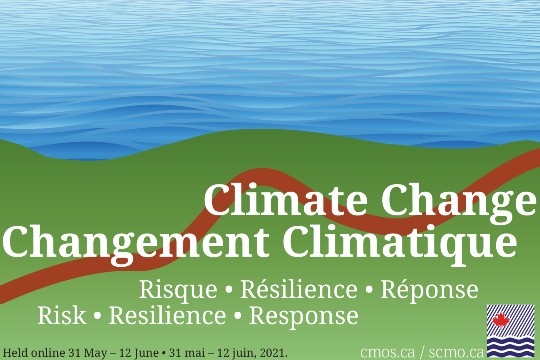
55th Canadian Meteorological and Oceanographic Society (CMOS) Congress
Founder & CEO, Dr. Elvis Asong, and colleagues have convened a session, “Integrating Climate Change Adaptation in Engineering and Environmental Design: Opportunities and Challenges,” targeted at project managers and professionals who grapple with enhancing the climate resilience of projects in practice. The Canadian Meteorological and Oceanographic Society (CMOS) will host its 55th Congress from 31 May to 11 June, 2021 in a virtual/on-line format – hosted by the Vancouver Island Centre of CMOS.
Please submit abstracts electronically via the link: https://cmos.ca/site/congress/abstract_submission?nav=sidebar by 22 February 2021. A non-refundable fee of $60.00 is required to complete your submission. Your abstract will be evaluated by the Scientific Programme Committee and you will be notified by the end of March 2021 of the presentation details, including if your presentation is to be oral or by poster.
Session details:
Title: Integrating Climate Change Adaptation in Engineering and Environmental Design: Opportunities and Challenges
Conveners:
Elvis Z. Asong, Ph.D., Principal Climate Scientist, Climalogik Inc.
Xin Qiu, Ph.D., P.Met, EP, ACM, Principal, Technical Director, Climate Change and Air Quality, SLR Consulting
Andre Erler, Ph.D., Senior Climate Scientist, Aquanty Inc.
It is now unequivocal that anthropogenic climate change presents substantial uncertainty and shapes important decisions about the structure of economies, human development, natural resource use, and ways to reduce vulnerability and risks to extreme weather. Risks related to this uncertainty has grown as the 21st century progresses, along with the recognition that these risks must be factored into the design, construction, location, and operation of key cross-sectoral infrastructure and resource planning. But how do managers and professionals plan for uncertain climate change magnitudes and timelines? This challenging question often leads to adoption of a “wait and see” holding pattern, in the hope that climate science can be improved, and uncertainties narrowed before decision-making becomes urgent. However, postponing an honest assessment of climate change risks and assuming a “business-as-usual” approach to planning is a risky proposition. Since it is certain that the global climate is changing, planning that assumes a constant climate from the past, present, and into the future is, unfortunately, flawed. In short, there is no time like the present to begin factoring practical climate change considerations into cross-sectoral decision making, even considering uncertainty in the magnitude of future change. We invite contributions in the areas:
- Tailoring of climate scenarios information for use in conjunction with sector-specific impacts, vulnerability, and risk models. Particularly, statistical and dynamical downscaling (including bias correction) of:
- High-resolution weather forecasts for user applications
- Climate projections for site-specific real-world applications. The focus here is on downscaling of extreme events
- Methods and tools for making vulnerable investments climate resilient. Both bottom-up and top-down impacts, vulnerability, and risk integration approaches and combinations thereof are desirable
- Approaches for treatment of weather- and climate-related uncertainty and non-stationarity as they impact coping ranges, critical thresholds, vulnerabilities, and success criteria for different projects are welcome